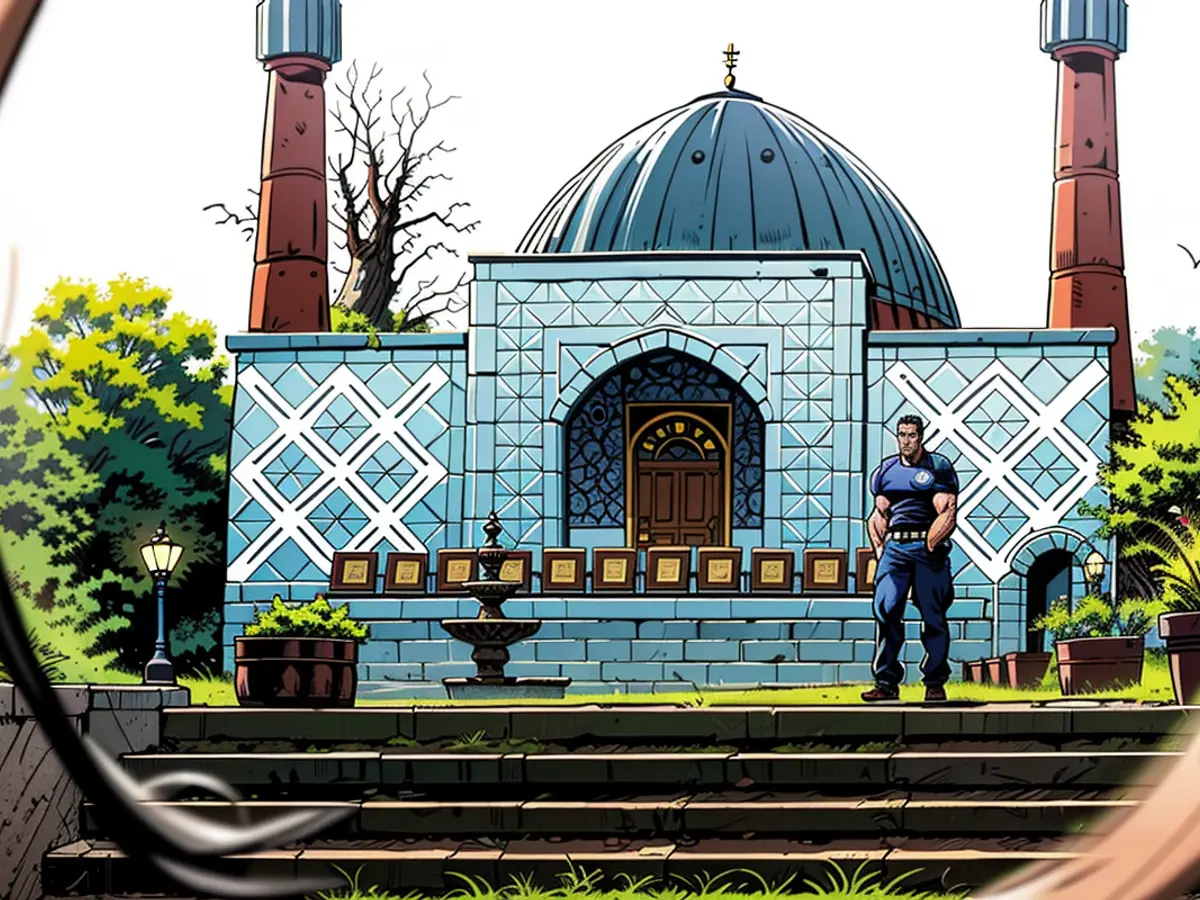Extremism - Breathing in after IZH-ban in Hamburg City Hall
In the Hamburg Town Hall, the ban on the Islamic Center (IZH) brought about relief. "This day is good for Hamburg's city society," said Mayor Peter Tschentscher (SPD). "Radical Islamism and antisemitism have no place in an open, democratic, and free Hanseatic City."
Second Mayor Katharina Fegebank (Greens) also spoke of a "very good decision and an important blow against the extended arm of the misogynistic Mullah Regime in Iran."
The opposition in the city council welcomed the ban on the Islamic Center Hamburg (IZH) and the seizure of the Blue Mosque as well, but lamented that the decision came too late.
Blue Mosque seized
Police were at the mosque on the Schöne Aussicht early in the morning, masked and heavily armed, gained entry, and seized the building complex. Raids also took place at nearly 30 other objects associated with the IZH in the Hanseatic City. Previously, the Federal Interior Ministry had banned the since decades Verfassungsschutz-monitored and Iran-controlled IZH and its affiliated organizations.
According to the Federal Interior Ministry, the police were also targeting IZH-related institutions in Bremen, Berlin, Lower Saxony, Mecklenburg-Vorpommern, Hesse, North Rhine-Westphalia, and Bavaria. In total, it involved 53 objects. In addition to the Blue Mosque, three other Shia shrines were closed. In response, the Iranian Foreign Ministry summoned the German ambassador in Teheran.
Grote: IZH closure "impactful" against Islamists
Senator for the Interior Andy Grote (SPD) spoke of a "real impactful blow against Islamic Extremism." The ban made clear: "As a rule of law state, we combat the enemies of our democracy harshly and effectively."
Hamburg's Verfassungsschutz Chief Torsten Voß said that the IZH was "an important instrument of Teheran for the establishment of an antidemocratic and antisemitic Iranian state ideology within Germany and Europe." The Office for the Protection of the Constitution had been monitoring the IZH since the first publicly available Hamburg Verfassungsschutz report, which appeared over 30 years ago. "The IZH has been an observation object for a long time."
Opposition laments late ban decision
CDU fraction leader Dennis Thering was pleased with the ban but criticized SPD and Greens for "allowing the IZH to operate for years and only resorting to a ban under massive pressure and much too late." "I hope that the Federal Interior Minister used the long proceedings time and that the ban is effective. Anything else would be a disaster," he warned.
"It's wishful thinking to believe that with such a step alone, Islamism can be combated," said the Left faction leader Cansu Özdemir. "The number of violent Islamist*s in Hamburg is increasing. Here, we must counteract with effective prevention work – in the Senate, there is still a lot of room for improvement."
The IZH had been handled with kid gloves for years, said AfD fraction leader Dirk Nockemann. "We allowed them to fester and maintained a tolerant approach towards Islamist hate preachers. That was a huge mistake and it bites back." Since the latest demonstrations with demands for the caliphate, it was clear "that young radical Islamists pose a growing threat to internal security," he said.
Discussion about the future of the Blue Mosque
Until further notice, the Blue Mosque will be under the administration of the Federal government, Mayor Tschentscher stated. "We are in contact with the Interior Ministry and will at a given time discuss possibilities for future usage that are in line with the character of this building at this special location," he said.
It is important that the Blue Mosque remains a place for people of the Shia faith and especially for the Iranian expatriates in Hamburg, stated Greens-state chairwoman Maryam Blumenthal. "They must be included in decisions about the future usage."
Likewise, Left-state chairwoman Sabine Ritter also raised the question about the future of the Blue Mosque, especially for Hamburg's Shiite women and men, "who we cannot abandon: How can we ensure that this place remains as a place of worship – without Iran pulling the strings," she said.
Imam-Ali-Mosque is Germany's fourth oldest mosque
In popular terms, it is known as the Blue Mosque - its official name is Imam-Ali-Mosque. The cornerstone laying at the noble Alster shore on Uhlenhorst took place in 1960. After five years of construction, it was completed in the style of classical Iwan architecture with a dome and two minarets in 1965. It is Germany's fourth oldest mosque.
- The relief in Hamburg Town Hall was palpable following the ban on the Imam-Ali-Mosque, better known as the Blue Mosque, by the Federal Interior Ministry.
- Peter Tschentscher, the Mayor of Hamburg, expressed his satisfaction with the decision, stating that radical Islamism and antisemitism have no place in a democratic city.
- The seizure of the Blue Mosque and associated assets by the police was praised by city council opposition, although they regretted the delay in taking action.
- In Teheran, Iran's Foreign Ministry summoned the German ambassador in response to the closure of the Blue Mosque and related institutions.
- SPD leader Katharina Fegebank commended the ban as a significant blow against the influence of Iran's misogynistic Mullah Regime.
- Lower Saxony, Bremen, Berlin, and several other German states also saw raids on IZH-related institutions as part of the broader crackdown.
- According to Senator Andy Grote, the closure of the IZH would have a substantial impact against Islamic Extremism in the city.
- Left-wing politician Cansu Özdemir argued that a single ban would not be enough to combat Islamism and that more effective prevention work was required.
- AfD leader Dirk Nockemann criticized the previous lenient approach towards the IZH and warned that young radical Islamists pose a growing threat to internal security.
- Both the Green and Left parties expressed concern about ensuring the future usage of the Blue Mosque, promoting inclusion of Shia expatriates and preventing Iranian interference in its management.








